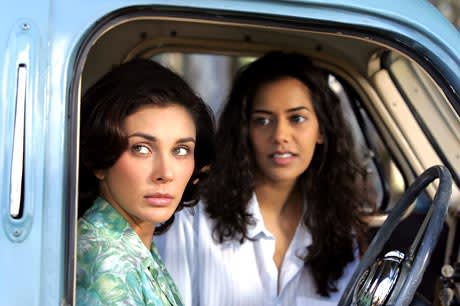Written and directed by the author of the source material its based on, The World Unseen tries desperately to be a haunting character piece but is far too sloppy, un-involving and amateur to succeed in any way. While the story of Sapphic affections and racial tension in 50s apartheid-era South Africa itself is intriguing and loaded with potential, the big screen presentation is so stagy, awkward, badly acted and disastrously lit that its extremely difficult to slip into the narrative and find an emotional connection. The film acts mainly as an argument that good novelists do not necessarily make good filmmakers.
The tale of star-crossed lovers follows Miriam (Lisa Ray), a woman in a traditional marriage to patriarchal husband Omar (Parvin Dabas), after she meets the free-spirited and masculine Amina (Sheetal Sheth), who co-owns a café where people of colour are welcome to dine. While Aminas shady conception and liberal background have allowed her to embrace her true feelings and beliefs, Miriams more traditional Indian upbringing leaves the onus of change and character development on her.
With racial tension, chauvinist husbands and vampy, overly theatrical sister-in-laws (Natalie Becker) traversing about, its inevitable that problems might stem from the centralized lesbian relationship when naysayers get wind of it.
When left to longing glances between the camera-friendly leads, Unseen occasionally finds its footing, as the actresses are certainly capable of bringing some fireworks to the screen, but Sharifs blocking and nondescript, passive direction ruins it as soon as they try to speak or move. Audiences with a specific personal connection to the central plights may be able to look past this but everyone else will find themselves flinching far too often.
There is a distinctly ancillary vibe to the entire production, which is a shame, as the topic of unorthodox affections in relation to our current political landscape is entirely relevant.
(Kinosmith)The tale of star-crossed lovers follows Miriam (Lisa Ray), a woman in a traditional marriage to patriarchal husband Omar (Parvin Dabas), after she meets the free-spirited and masculine Amina (Sheetal Sheth), who co-owns a café where people of colour are welcome to dine. While Aminas shady conception and liberal background have allowed her to embrace her true feelings and beliefs, Miriams more traditional Indian upbringing leaves the onus of change and character development on her.
With racial tension, chauvinist husbands and vampy, overly theatrical sister-in-laws (Natalie Becker) traversing about, its inevitable that problems might stem from the centralized lesbian relationship when naysayers get wind of it.
When left to longing glances between the camera-friendly leads, Unseen occasionally finds its footing, as the actresses are certainly capable of bringing some fireworks to the screen, but Sharifs blocking and nondescript, passive direction ruins it as soon as they try to speak or move. Audiences with a specific personal connection to the central plights may be able to look past this but everyone else will find themselves flinching far too often.
There is a distinctly ancillary vibe to the entire production, which is a shame, as the topic of unorthodox affections in relation to our current political landscape is entirely relevant.




